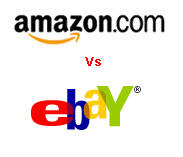eBay power sellers: Amazon is kicking eBay's tail

Three eBay power sellers are painting a mixed picture at best for the auction site and note that the recession and Amazon are thumping the company.
These power sellers, Skip McGrath, an eBay Gold PowerSeller; Steve Lindhorst is a former eBay University instructor; and Ron Saxton, whose Image Warehouse, is an eBay PowerSeller, were gathered by Bernstein analyst Jeffrey Lindsay for a conference call.

eBay sellers are taking a hit from the recession. These eBay users say sales were down 12 percent to 20 percent from a year ago. Saxton, who resells refilled ink cartridges, said sales were up 15 percent. However, baby products and anything do-it-yourself sell well. Apparently a crappy economy has led to a baby boom of sorts in the U.S., said McGrath. Stray hunch: People are cutting back on cable so are looking for something to do.
Amazon's third party platform performs better. Lindsay wrote:
Although they found Amazon's fee load is typically higher than eBay's – 15% versus 12% on eBay, they preferred to do business on Amazon because of its higher degree of automation, its low-touch sales model which avoided having to email back and forth with customers, and access to Amazon's fulfillment services. They noted that eBay could match all of these advantages should it to choose to do so, using fulfillment services from third party companies if necessary.
Saxton said:
I just started on Amazon back in July, and I’ve experienced 22% minimum growth every month since. The potential with Amazon right now for me is much, much bigger than it is with eBay, and I’ve been with eBay - this will be my 12th year, actually.
The big question: Why doesn't eBay match Amazon's features? My hunch: eBay can't match Amazon's information systems, which have automated out a lot of the e-commerce hassles. Meanwhile, Saxton noted that eBay buyers can be high maintenance. Simply put, haggling is out. Automation is in.
McGrath hones in on the communication issues on eBay as a seller:
The products I sell on Amazon are in the $200 to $300 range. And I find, as far as treatment, how Amazon treats me? Fine. I mean I’ve never had any issues or problems with Amazon. I had one return once, and it went smoothly and everybody was happy. Whereas eBay can be a challenge. You know, things - just all the stuff that goes on with sellers and the communication. I think that’s the big thing for the seller, is that Amazon requires so much less work and communication. eBay - the thing on eBay [is] you’ve got to keep your feedback up and your DSRs [Detailed Seller Ratings] up. If you’re going to keep your DSRs high to get the fee discounts and get the search placement, then you need to do very high-touch customer service. There’s just two of us in our business, just my wife and I, and my wife does all the customer service. But she works at it; she’s on that computer talking to people from seven in the morning until seven at night to keep the business going. Whereas on Amazon, we get an order, it comes into my computer, I forward it to her, she enters it on the website of the manufacturer, the manufacturer ships it, and I’m done. So it’s real simple.
eBay's strategy to sign up discounters and liquidators will fail. The three powersellers say that eBay's secondary market strategy is designed to boost volume, but is going to hurt revenue and margin growth. Why? There will be more listings, lower sell-through and the clutter will alienate current eBay sellers.
All of that said, eBay has made some big improvements (that few have noticed). The powersellers say that eBay has cut fraud rates, is leveraging PayPal well and seller reviews are ditching ineffective participants in the market. Simply put, eBay has improved the customer experience, but needs to put some marketing heft behind the improvements.
Add it up and eBay still has a lot of improvement ahead of it. Lindsay sums up:
eBay could do much better in several key areas: (a) search was still weak, (b) the site still had a "flea market" look and feel to it; (c) eBay could/should introduce labor-saving automation such as UPC readers to simplify item listings as Amazon does already; (d) eBay should separate the auction business for unique one-off items and collectibles) from the retail business (quantities of multiple items) they felt that eBay Express had been promising but management failed on execution and publicity – they think a similar approach would likely succeed if implemented more thoughtfully; (e) eBay should offer fulfillment services through third parties such as Shipwire.com and even Amazon's FBA; (f) cross-border sales had been suppressed and this was a mistake; (g) outsourcing keywords to Microsoft had been a mistake and was generating far less traffic than when keywords were bought primarily from Google; (h) finally the CEO, John Donahoe, could do more to "woo" the seller community who found him somewhat cold and analytical.
That's a hefty excerpt but I included it verbatim to show that Lindsay's improvement list made it all the way to the letter "h." Bottom line: eBay is highly unlikely to close the Amazon gap. Amazon isn't the type of company that will stand still and eBay is improving at a slower pace. By time eBay matches Amazon the e-tailing giant will have rolled out a bevy of new improvements.
What should eBay do? Lindsay says that eBay should ditch its growth plans, cut costs and revert to what it does best---auctions. Sure, eBay would be a slow growth company, but it'll be a cash cow that can spin off dough to shareholders.
Can eBay close its Amazon gap?